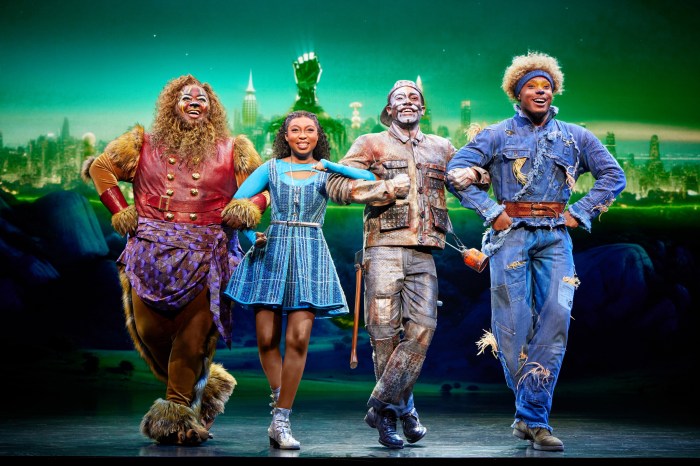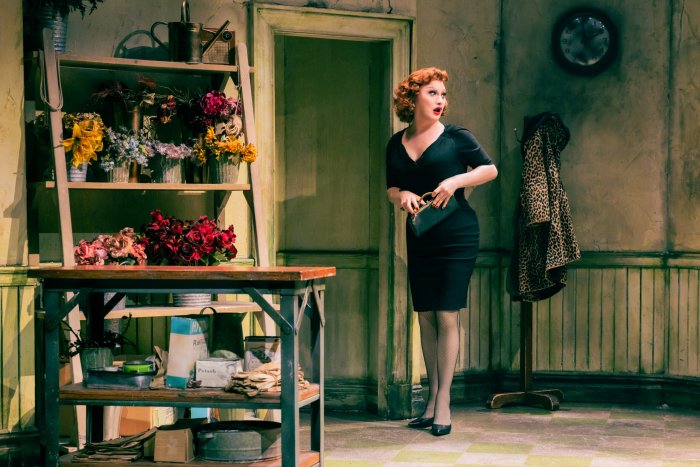Jefferson Mays and Jennifer Ehle in J.T. Rogers’ “Oslo,” directed by Bartlett Sher, at Lincoln Center through August 28, and than transferring to Broadway in the spring. | T. CHARLES ERICKSON
If the prospect of sitting through three hours of Mideast political negotiations on a sultry summer night seems daunting, I understand. But you should not miss this fascinating play about the 1993 Oslo Accords, a most unlikely peace negotiated between Israel and Palestine in Norway.
On the surface, “Oslo” is the literal story of how a Norwegian diplomat, Terje Rod-Larsen, and his wife, Mona Juul, brought these legendary adversaries together to talk away from the world’s spotlight. The advances, reversals, negotiations, fights, and ultimately agreement that occurred over the course of about 18 months are beautifully chronicled in J.T. Rogers’ script.
This is also a very human story of people who set out to do great things and change the world and must do battle with their histories and identities along the way. It is not an easy peace that is forged but one dependent on a willingness to bend, the need to save face, and the advantages of “constructive ambiguity” in a treaty.
Brilliant historical thriller in Norway, self-indulgence in Belfast, just plain crass in Virginia
Notwithstanding the seriousness of the subject matter, Rogers writes with great good humor and sustained tension. This is a cloak-and-dagger political thriller — though on a small scale on Michael Yeargan’s economical set — where common ground is found through the common consumption of scotch and waffles. Indeed, it’s Rogers’ ability to make these quotidian touches so effective at illuminating character that makes the sausage-making of diplomacy and the crafting of policy so accessible and the play so fascinating. The events of the play, which were conducted in private and shrouded in secrecy, are punctuated by reminders of the devastating history of violence between Israel and Palestine conveyed through a series of chilling projections. This context makes the moment of agreement among the most compelling theater of recent memory — and the heartbreak that the accords did not hold even more distressing.
Bartlett Sher has directed brilliantly. He remains the master of finding the human center of outsized characters — as he does in the musicals he directs. He is helped by a stellar cast that includes a magnificent performance by Jefferson Mays as Rod-Larsen and a brilliantly understated, grounded, and powerful portrayal of Juul by Jennifer Ehle. They provide a stabilizing, if sometimes appealingly idiosyncratic force against the more dramatic actions of Israeli cabinet member Uri Savir, in a remarkable rock-star performance from Michael Aronov, and Ahmed Qurei, the Palestine Liberation Organization finance minister, given a more restrained but incisive characterization by Anthony Azizi.
Though the current Lincoln Center production is almost completely sold out, the production is moving to the Vivian Beaumont on Broadway next March. It’s not too early to book your seats.
Declan Conlon and Patrick O’Kane in Owen McCafferty’s “Quietly,” at the Irish Rep. | JAMES HIGGINS
“Quietly” is a tale of anger and forgiveness in present-day Belfast, but with echoes that reach back more than 40 years. Ian has agreed to meet Jimmy in a bar to talk about the events of 1974, when Ian, then 16, threw a bomb into the same bar, killing Jimmy’s father and four others. Over the course of the 75-minute play, the characters tell their stories, air their grievances, and describe how both their lives have been shattered by this event.
For all the angst-ridden soul-baring that goes into this talky hour and a quarter, Owen McCafferty’s play seems contrived. Would these men have really met? What are they seeking? What will come out of this meeting? These are the basic questions the playwright should ask but appears not to have. So, rather than a dramatic arc, we get a lot of posturing and yelling.
We certainly understand that these men have been severely damaged by the events of four decades before that shaped their lives, but it isn’t really enough to make a compelling play. Neither character is sympathetic beyond his wounds, and though they shake hands at the end there is no resolution and no insight into why there may not have been. The playwright has opted for pyrotechnics rather than probing character development. A litany of hurts and resentments is not an alternative to more substantive insights.
The actors Patrick O’Kane as Jimmy and Declan Conlon as Ian approach their roles with force and focus, but despite the theatricality of the work, the hearts of these men always stay distant. There is another character, a Polish bartender played by Robert Zawadzki, but he, like the audience, is relegated to the role of passive observer who remains unmoved.
Given the current political climate, someone involved in the production of “Butler” might have considered that attempting to stage a comedy about slavery is either tone-deaf, cynical, or both. The play, by Richard Stand, is the story of a runaway slave seeking sanctuary at Fort Monroe in Virginia, right before the start of the Civil War, the day after Virginia seceded from the Union. The story turns on how one General Butler ostensibly saves the slave Shepard Mallory from being returned to his owner in the South. Butler, it turns out, is a lawyer, and he interprets the Articles of War to prevent Shepard from being returned. All very well and good, but the interpretation still turns on Shepard being property, and though Butler is motivated to save Shepard from certain death the tone is all wrong.
Strand imagines the interaction between the two men as a war of wits, with vaudeville style bits, over-the-top slow burns, and comic banter. It’s as offensive to attempt to make light of the real dangers slaves faced trying to get away as it is to romanticize the reality of slavery. As it happens, I saw this production the same day Bill O’Reilly on Fox said that the slaves who built the White House were well fed, as if that possibility mitigated the fact that they were slaves.
Director Joseph Discher has directed this as if it were a Kaufman and Hart play or a tacky sitcom, and the performances match the style. Ames Adamson as Butler is insufferable. He plays the role as if he were in a Looney Tunes cartoon, a cross between Yosemite Sam and Foghorn Leghorn — with due apologies to those comic icons. John G. Williams as Mallory is reduced to a stereotypical wisecracking character. We’re supposed to think he has an irrepressible spirit and can’t help himself, but it’s not believable, particularly when he bares the scars on his back from being whipped. The other two characters, Lieutenant Kelly, Butler’s adjutant played by Benjamin Sterling, and Major Cary, sent for Shepard by his owner and played by David Sitler, exist for the other two to bounce jokes off. Again, pure sitcom drivel.
It’s almost unthinkable that a company could defend mounting a play this insensitive and demeaning in 2016, but, then, a lot of what’s happening around us in today’s world is also unthinkable.
OSLO | Mitzi E. Newhouse Theater, 150 W. 65th St. | Through Aug. 28:Tue., Thu. at 7 p.m.; Wed., Fri.-Sat. at 8 p.m.; Wed., Sat. at 2 p.m.; Sun. at 3 p.m. | $107 at telecharge.com or 212-239-6200 | Three hrs., with two intermissions
QUIETLY | Irish Repertory Theatre, 132 W. 22nd St. | Through Sep. 11: Tue., Thu. at 7 p.m.; Wed., Fri.-Sat. at 8 p.m.; Wed., Sat.-Sun. at 3 p.m. | $50-$70 at ovationtix.com or 212-727-2737 | 75 mins., no intermission
BUTLER | 59E59 Theaters, 59 E. 59th St. | Through Aug. 28: Tue-Thu. at 7 p.m.; Fri.-Sat. at 8 p.m.; Sat. at 2 p.m.; Sun. at 3 p.m. | $25-$70 at ticketcentral.com or 212-279-4200 | Two hrs., with intermission



































